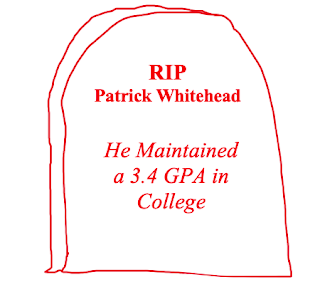Begin With The End in Mind (Take a 30-Year Perspective)
Last Summer I got really into the financial planning idea of FI/RE, which stands for "financial independence; retire early." The goal of FI is to get to a financial place in life where you no longer have to work for money. When you achieve financial independence you can work for pleasure, personal interest, or life-satisfaction, but you are no longer depending on a paycheck to get by. Financially independent people can walk away from their jobs, if they'd like to.
So I got to work saving a significant portion of each paycheck, and counting down the years until I would reach financial independence. Then I got bored. I began to wonder: "Why not buy a new car/toy/fancy suit?" My problem? I didn't have a why.
Money is not a why. I write that for my benefit as much as yours. Money can help facilitate my goals. Money can provide security, capital, collateral, and so on. But, all by itself, it cannot do anything for me.
When I asked myself: "What is the purpose of becoming financially independent?" here was my response: "I want to be able to continue teaching, but to have time to do chores around my house, travel to state and national parks, and to run recreational ultramarathons (50-100 mile races)."
In other words, I realized that I could do all of that right now. In other words, my "Why" was already satisfied. So what was I saving so much money for? I didn't have a good answer. (I still don't, so once I have a reason to begin spending more than I am, I can simply adjust how much I'm saving.)
Take a Look at Your Own Significant Life Goals. Do You Have a Why?
Having a why helps put things in perspective. You will be pushed and shoved by others' expectations, passing trends, and changing interests. Companies spend billions of dollars trying to convince you what you need to buy. But your why will remain constant, because it is based on personal long-term goals and values.
Another way of answering the question of "why" is to begin with the end in mind. In your imagination, jump 30 years down the road. This will be a long time after going to college or starting a job or family. Now ask yourself: "what do I want others to remember about the kind of person that I was?" A morbid way of doing this would be jumping all the way to your funeral and asking: "How do I want to be remembered?"
A 20-year-old college student might really want to keep a 3.5 or higher GPA. To see their why, they would ask themselves: "When I am 50, will it be important to me that I got an A in PSYC 2103?" Probably not.
(From personal experience: I am only 15 years from college, and I already don't care what my college or high school GPA was. I honestly don't even remember. It was somewhere between 2.8 and 3.7. What was important was that it didn't close any occupational doors for me. I was still able to attend graduate school.)
Why Beginning with the End in Mind is Important for College Students
If you are waiting to receive your instructions from others--parents, teachers, university checklists, and so on--then you have already missed out on an important step. This step is deciding for yourself what is important to you and what isn't. What are your priorities? The student who answers this question does whatever is necessary to solve their problems, finish their degree programs, and take their lives into their own hands.
Several years ago I examined first generation college students to see if I could understand why they were more likely than non-first generation students to feel imposter syndrome, which is the belief that they don't belong in college. What I found was that these students felt like they were playing a role that somebody else had set up for them.
But a few students we interviewed were different. They had decided for themselves that they wanted a college degree in order to become teachers or nurses or accountants. In other words, they had a why. They wanted to become the best teacher or nurse or accountant that they could. They didn't care about an A- or a B+. They were already thinking about the problems they would face in their careers. Meaningful problems. Incidentally, these students realized that going to college was their best way forward, and that they had better go ahead and make the most of it. They were more likely to handle hardships when they occurred. Their fortitude was impressive.
So go ahead and Zoom Out 30 years. Begin with the end in mind. What is all of this for? Why are you doing it? When you can answer that, make sure what you're doing today fits into that goal. If today's choices don't fit, then you might think about making a change.



Comments
Post a Comment